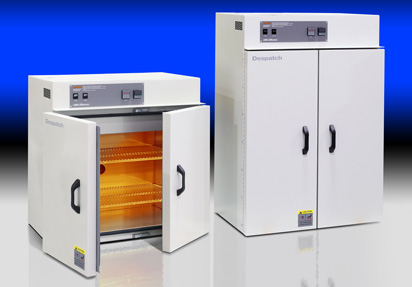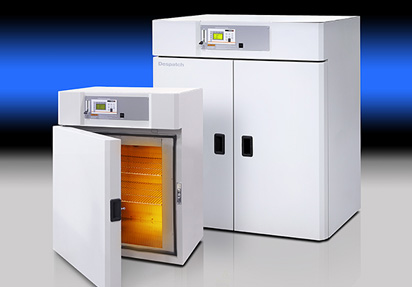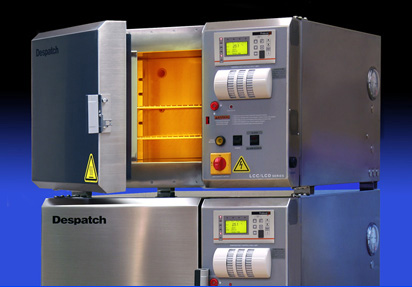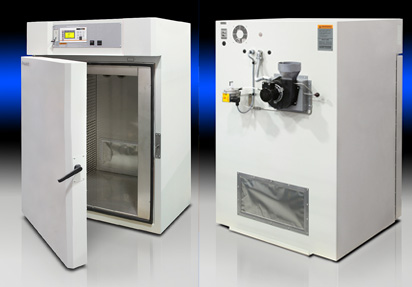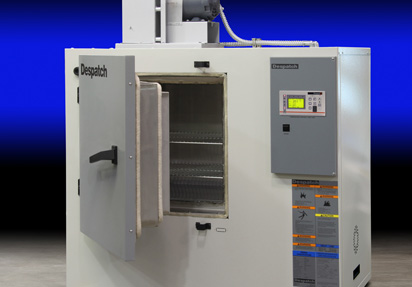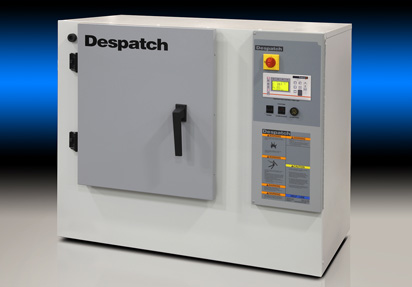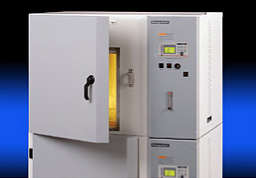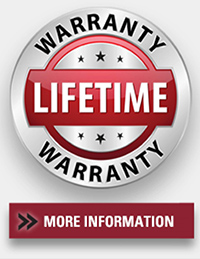Common Types
of Laboratory Ovens
Despatch offers a variety of lab ovens to meet the specific needs of
different
applications:
- Forced Air Convection Ovens: These ovens ensure even
heat distribution
throughout the chamber, making them ideal for drying, baking, and curing
processes. They offer rapid heating capabilities and temperature ranges
from
+10°C to 600°F (315°C) or higher.
- Gravity Convection Ovens: Best suited for tasks
requiring less temperature
uniformity, such as sterilizing and curing. These ovens have temperature
ranges from +25°F to 450°F (232°C) and feature natural air circulation
for
energy efficiency.
- Vacuum Ovens: Combining heat with vacuum pressure,
these ovens are
perfect for drying heat-sensitive materials gently and efficiently. They
are
used
for sterilization, removing solvents, and dehydration with temperature
ranges
from +25°F to 500°F (260°C).
- High-Temperature Ovens: Designed to withstand extreme
temperatures from
250°C to 1200°C (482°F to 2192°F), these ovens are suitable for
demanding
applications like curing, annealing, and preheating, offering rapid
heating
and
cooling.
Lab Oven Applications
Lab ovens are versatile instruments essential in many scientific disciplines,
including
materials science, chemistry, pharmaceuticals, environmental science,
electronics,
and forensic science. These ovens are used for a wide range of applications:
- Drying glassware and lab equipment
- Sterilizing surgical instruments and laboratory tools
- Evaporating solvents from chemical samples
- Incubating cultures at precise temperatures
- Curing materials like coating, adhesives and polymers
- Conducting material testing with high stability and repeatability
Despatch lab ovens are designed to provide maximum versatility in compact
spaces,
ensuring that research activities are carried out efficiently without
compromising on
precision.
Key
Consideration for Choosing a
Lab Oven
When selecting a lab oven, consider the following factors to ensure the right
fit for
your research needs:
- For vacuum ovens, consider vacuum level, chamber size, and material
compatibility.
- For gravity convection ovens, look at temperature range, energy
efficiency,
and ease of use.
- For forced air convection ovens, evaluate temperature range, airflow
uniformity, and noise level.
- For high-temperature ovens, consider temperature range, insulation, and
power requirements.
Still unsure which lab oven you need?
We're here to help!c
Despatch product specialists are trained to help you find the right
product
for your process or application.
CONTACT
US
Benefits of
Using Despatch Lab
Ovens
Every Despatch lab oven, except for the LBB series, is equipped with the
Protocol
3™ microprocessor-based temperature and hi-limit controller, which features
a large
LCD display. This system offers advanced data-logging capabilities for
reporting,
analyzing, and exporting data via a USB port. The optional software allows
for
remote oven control from a computer, recording critical information such as
times,
temperatures, set points, alarm conditions, and lot numbers. The data can be
saved
in an editable format, easily integrated into Excel.
They’re designed to offer maximum versatility, making them ideal for a wide
range of
scientific and industrial applications, including drying, sterilization,
curing, material
testing, and incubation. Their unique horizontal airflow system delivers
uniform
heating across all shelves, ensuring consistent and reliable results, unlike
most lab
ovens that use vertical airflow. This design feature is achieved through a
high-
volume fan that circulates air through perforated stainless steel walls,
creating
constant horizontal airflow for shorter cycle times and controlled ramp
rates.
Despatch lab ovens are constructed for durability and ease of maintenance.
They
feature stainless steel interiors, smooth door surfaces, sturdy welded
double-wall
construction, thick glass fiber insulation, and heavy-duty door gaskets.
Each oven
undergoes rigorous quality and performance testing before shipping, ensuring
reliability. Heating elements come with a five-year warranty.
They offer:
- Vacuum Ovens: Efficient drying for heat-sensitive materials
- Forced Air Convection Ovens: Quick and uniform heat distribution.
- Gravity Convection Ovens: Cost-effective for general drying and
heating.
- High-Temperature Ovens: Capabilities for specialized, high-temperature
applications.
Selecting the right Despatch lab oven ensures optimal performance and
reliability,
catering to the specific needs of any research project.
Lab Ovens
for Hazardous Areas
and Flammable Solvents
Despatch also provides Class A lab ovens designed for use in hazardous areas
where there is a risk of explosion due to dust, vapors, or gases. These
ovens meet
NFPA 86 requirements and come equipped with special features, including a
pressure relief panel, purge timer, and exhaust fan, to ensure safety when
working
with flammable solvents and materials.
Specialized
Ovens for Clean
Processes
For applications where minimal contamination is critical, such as in
semiconductor
packaging, life sciences, and sterilization processes, Despatch offers the
LCC or
LCD Series lab ovens. These models feature 100% HEPA-filtered recirculated
airflow, maintaining ISO Class 5 (Class 100) or better cleanliness within
the oven
chamber.
These units are stackable, optimizing laboratory space and ergonomic
efficiency.
Additionally, they can operate with an inert atmosphere, such as nitrogen,
to prevent
oxidation, and include water cooling coils for rapid cooling.
Industrial Oven
Selection
Chart
Frequently Asked Questions
What is the difference between a lab drying oven and a convection oven?
Drying ovens are well-suited for removing moisture from samples using
precise
temperature control and heat uniformity. Convection ovens can also dry, but
they
are more suitable for heating, pre-heating, and curing.
What is the principal use of an
oven in a laboratory setting?
Researchers often use these ovens to dry, sterilize, and heat samples or
equipment. They provide precise temperature control for various scientific
processes
and experiments.
Can Despatch lab ovens be
customized to meet specific application
needs?
Yes, Despatch offers customization options to tailor lab ovens to specific
application
requirements. This can include modifications for temperature range, airflow
design,
chamber size, and additional features like inert atmosphere capability or rapid
cooling coils.
What temperature range is ideal
for most lab experiments?
The suitable temperature range for laboratory experiments varies widely
depending
on the application. Standard ranges range from ambient to 200°C for general
drying, to 300°C for sterilization, and to higher temperatures for
specialized
processes, like annealing or sintering.
How does Despatch support
customers after purchase?
Despatch offers comprehensive customer support, including technical
assistance,
maintenance advice, and access to replacement parts. Their customer service
team
can help troubleshoot issues and ensure that ovens continue to perform
optimally
throughout their lifespan.
Browse our range of high-performance laboratory ovens, or contact us today
to find
the perfect solution for your scientific research needs. Experience
unparalleled
precision and reliability with Despatch laboratory ovens.
You
may also be interested in:

